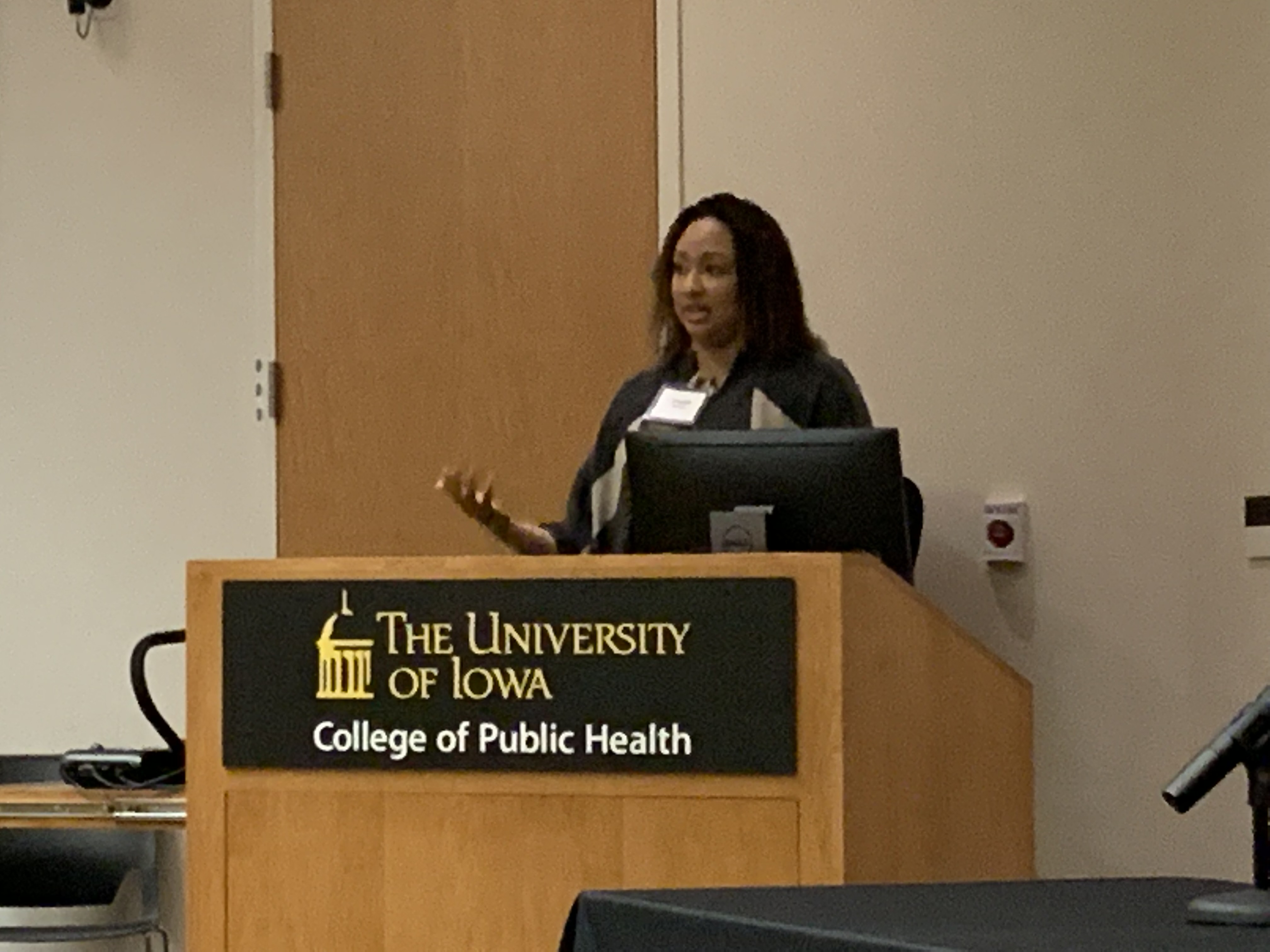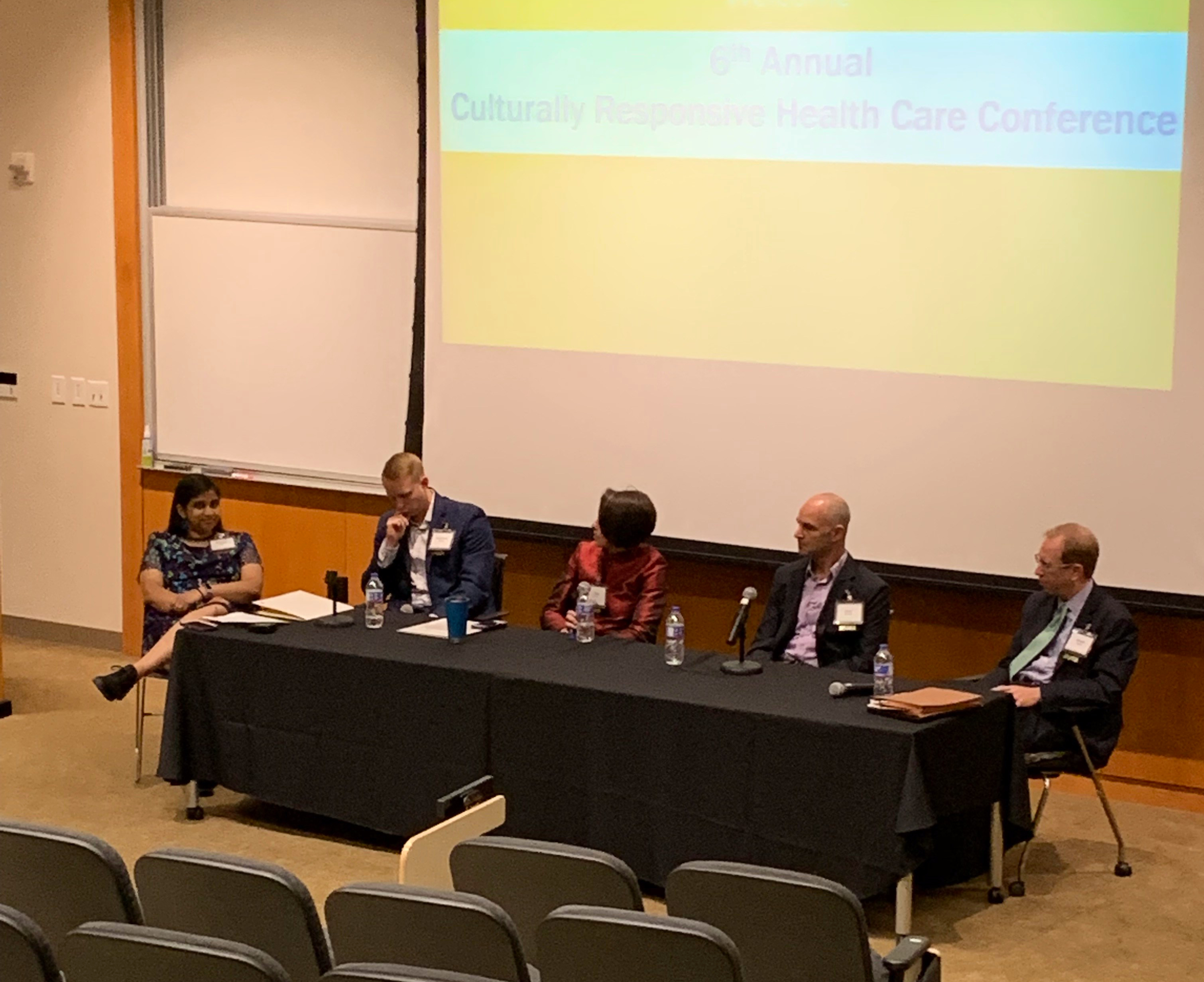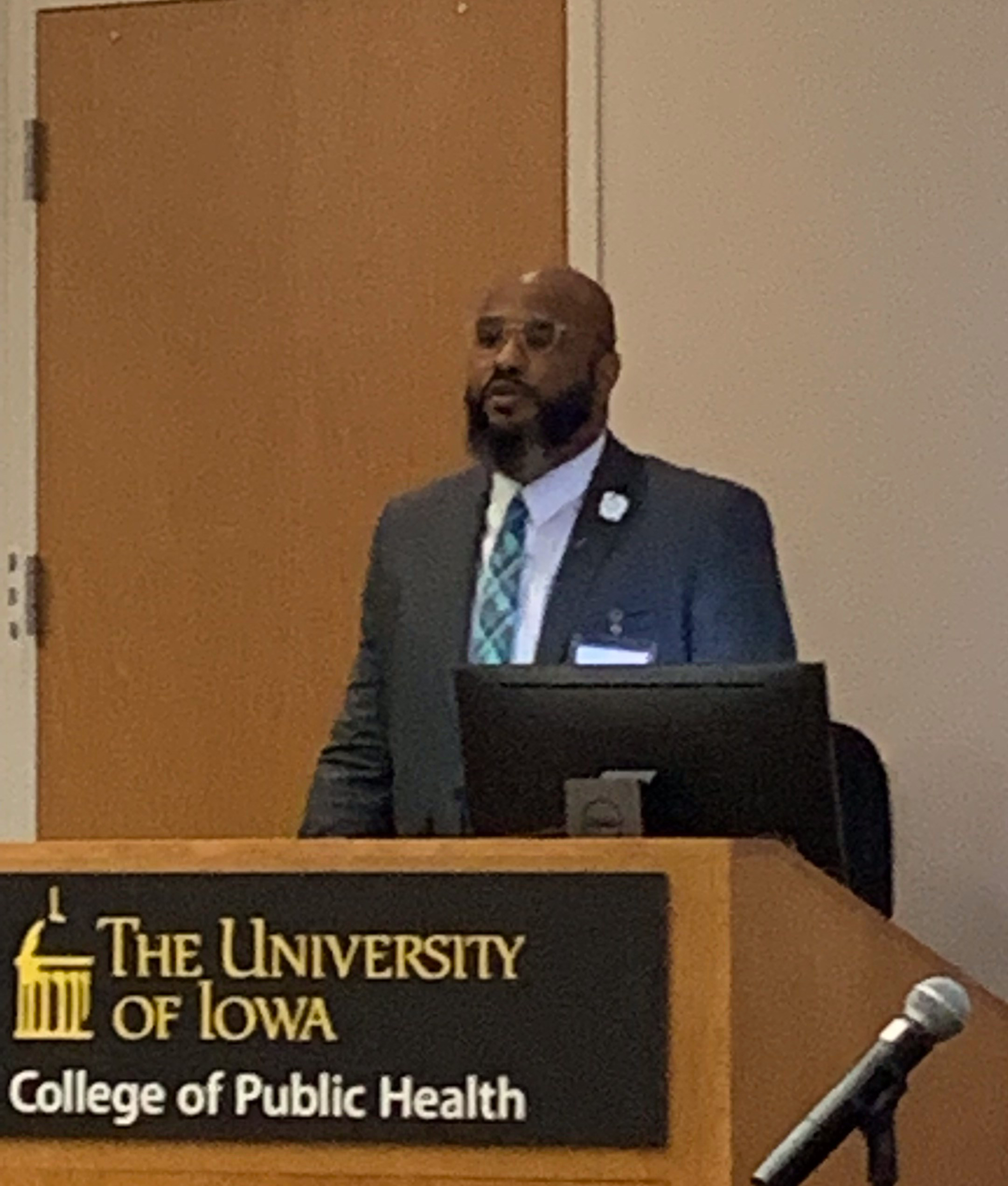Iowa City and the University of Iowa prides itself on being an ethnically and culturally diverse place, welcoming of difference. Demographics on their own, however, do not help the institution and its members from avoiding every instance of reproducing elements of systemic racism and bias. Most visibly, health care disparities can emerge in which women and minority groups experience unequal access or quality. One way to combat these disparities has taken the form of an annual inter-collegiate conference.
Members of the Colleges of Public Health, of Medicine, and of Nursing have come together to foster conversation and education around issues of cultural sensitivity and responsiveness in health care. Late last spring, the sixth annual event was held in the College of Public Health Building’s Callaghan Auditorium. The sunny Friday, which began with a warm welcome from Co-Chairs LouAnn Montgomery, PhD, RN-BC, and Poorani Sekar, MD, was an opportunity for attendees to discover new ways to provide a respectful and inclusive environment for all patients.
The morning keynote was delivered by Lastacia Coleman, ARNP, CNM, during which she presented a series of correlations between racial disparities and maternal mortality.  About 39% of mother mortalities occur in the post-partum period of motherhood, which Coleman identified as tending to coincide with a loss of Medicaid coverage. The National Partnership for Women and Families reports that black mothers are more at risk for fibroids, preterm labor, preeclampsia and hypertensive disorders, causing financial obstacles that challenge the mother’s wellbeing, especially without the assistance of Medicaid.
About 39% of mother mortalities occur in the post-partum period of motherhood, which Coleman identified as tending to coincide with a loss of Medicaid coverage. The National Partnership for Women and Families reports that black mothers are more at risk for fibroids, preterm labor, preeclampsia and hypertensive disorders, causing financial obstacles that challenge the mother’s wellbeing, especially without the assistance of Medicaid.
Nationally, Coleman revealed, mortality rates for black mothers are three to four times higher than white mothers. A combination, she said, of racism and sexism seems to be the main obstacle to avoiding adverse outcomes for new mothers. As a solution, Coleman suggests the application of the Alliance for Innovation on Maternal Health’s safety bundles, which recruit state specialists to specifically focus on maternal safety at hospitals, and collaboration with organizations like Black Mamas Matter. Because statistics also reveal that women visit emergency departments one to two times before death, Coleman also recommends histories add whether someone has recently pregnant to an ED’s list of questions.
Noelle Andrew, MDiv, BCC, director of Spiritual and Interpreting Services, then moderated a panel of individuals from Muslim, Amish, Mormon, and Christian Scientist communities: Paul Beachy, Quasainou Ansumana Keita, Martha Roadstrum Moffett, CSB, and Lane Strathearn, MBBS, FRACP, PhD. Andrew began the conversation by offering attendees a helpful tip. “Begin your conversations by having the patients discuss what healthcare looks like in their home community.”
Participants in the panel shared information about their religion’s view of different healthcare-related topics including organ donation, suicide, and end-of-life care. Overall, the panelists revealed more similarities than differences, especially on the importance of hearing, understanding, and honoring a patient’s values and choices.
After lunch, attendees could select from a variety of breakout workshops. “Providing Care to Undocumented Populations” was led by Denise Martinez, MD, associate dean of the Office of Cultural Affairs and Diversity Initiatives, and Adrian Silva, interpreter and translator, in the Office of the Patient Experience. “Caring for Trans* Patients” was led by Jessica Brierton, LMSW.  A team that consisted of Jonathan Bothell, MSN, RN; Joseph Clamon, JD; Lillian Erdahl, MD; and Peter Berkson formed a panel to discuss real-life scenarios staff have encountered and strategies to preserve health care worker and patient safety. In situations of conflict, the panel identified a few essential steps such as setting expectations, assuming positive intention, seeking support and guidance, and maintaining the dignity of all involved.
A team that consisted of Jonathan Bothell, MSN, RN; Joseph Clamon, JD; Lillian Erdahl, MD; and Peter Berkson formed a panel to discuss real-life scenarios staff have encountered and strategies to preserve health care worker and patient safety. In situations of conflict, the panel identified a few essential steps such as setting expectations, assuming positive intention, seeking support and guidance, and maintaining the dignity of all involved.
Director of ACCESS at Southern Illinois University Dominic Dorsey, MSEd,  presented the afternoon keynote, sharing his own study which found that 11% of students have a disability but only 4% report it to their institution because of a fear of the “burden” or implicit bias against them. Dorsey has developed a holistic system at his institution that considers the needs of people with disabilities through a social rather than medical lens. Students receiving tools and skills to succeed rather than “treatment” to “fix what is wrong.” Dorsey also suggested that those who label themselves as “woke” still need to perform regular self-assessment. Failure to use one’s privilege to end inequity, Dorsey said, is the same as being complicit with injustice.
presented the afternoon keynote, sharing his own study which found that 11% of students have a disability but only 4% report it to their institution because of a fear of the “burden” or implicit bias against them. Dorsey has developed a holistic system at his institution that considers the needs of people with disabilities through a social rather than medical lens. Students receiving tools and skills to succeed rather than “treatment” to “fix what is wrong.” Dorsey also suggested that those who label themselves as “woke” still need to perform regular self-assessment. Failure to use one’s privilege to end inequity, Dorsey said, is the same as being complicit with injustice.
Following Dorsey’s keynote, Derrick Willis, MPA, moderated a final panel with Pixie Plummer, MD, to discuss caring for people with disabilities, particularly the harmful effects of focusing on the diagnosis rather than the person. These inadvertent but damaging results often stem from what they called “diagnostic overshadowing,” which can cause providers to incorrectly assume problems all stem from the same source. Willis and Plummer introduced the Living Well Iowa program, which helps Iowans with disabilities achieve and maintain wellness and a full life through learning, working and being active in their communities.
Special thanks to the members of the planning committee for the planning and execution this year’s event, and for sending the notes and photographs for this report.

Planning Committee
Lou Ann Montgomery, PhD, RN-BC – Conference co-chair
Poorani Sekar, MD – Conference co-chair
Kristin Destrampe, BS
Valerie Garr, MA
Michael Hoenig, MA
Katie Imborek, MD
Trudy Laffoon, MA, RN-BC
Denise Martinez, MD
David Moser, PhD
Greg Nelson, MA, RN
Janet Niebuhr, BA
Lama Noureddine, MD
Lori Raw, BA
Sherry R. Timmons, DDS, PhD
Jon Van Heukelom, MD
Thomas Vaughn, PhD
Derrick Willis, MPA
One comment on “6th Annual Culturally Responsive Healthcare in Iowa, 5/31/19”